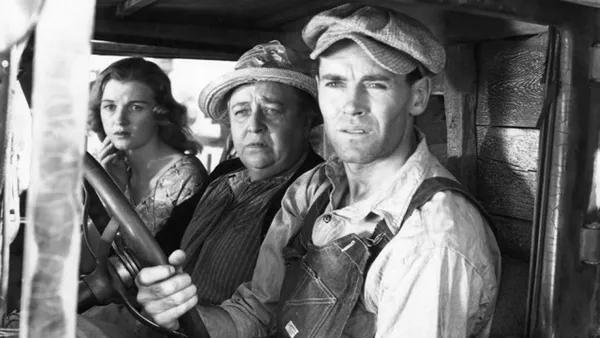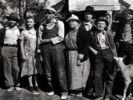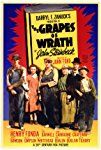Eye For Film >> Movies >> The Grapes Of Wrath (1940) Film Review
The Grapes Of Wrath
Reviewed by: Jennie Kermode

Many parts of the US suffered during the Great Depression, but in Oklahoma, whose economic sustainability had been touch and go for decades, it coincided with a drought. With the local oil industry disrupted as well, over a third of the state's population became unemployed, and the excess of labour, in the absence of effective regulation, meant employers could get away with offering less that subsistence level pay to those who still had jobs. It was this crisis that prompted John Steinbeck to write The Grapes Of Wrath, and a year later it was adapted for the big screen.
The first thing to note about this adaptation is that it is considerably more optimistic than the book. Its latter stages have been reworked to put the focus on survival and the triumph of the human spirit, though all Ma Joad's defiance cannot elide the fact that a lot of the characters we've met along the way have died. Steinbeck's more overt political point-making has also been removed (with the exception of a discussion about pay by striking fruit pickers), but this has the beneficial effect of slimming down the narrative, something which, as it's still over two hours long, is to be welcomed. It's also something which has become less problematic as the film has aged - viewers now no longer need to have no much explained to them.

The story follows Ma Joad and her extended family as they are forced off their land and travel cross-country in search of work. In particular, it focuses on her son, Tom (Henry Fonda), who has recently spent time in prison and is startled by the changes he finds in the place where he grew up. Other family members given detailed characterisation in the novel are shifted into the background, and though some time is still spent on issues around pregnancy, there's an overall sense that squeamishness has pushed women's issues out of sight. Fonda, however, makes a likeable lead and his similarity to beleaguered adventure heroes in the popular escapist films of the period may have helped the film's initial audiences to engage with it and stick with him through what was then a more challenging narrative.
Although the print has suffered over the years, one can still admire Gregg Toland's cinematography, which brings the landscapes of the US south west to life and recreates the famous dust bowl phenomenon never discussed in the film itself. John Ford, directing, segues between mid-shots of family members clustered together on their truck and broad panoramas which emphasise the vastness of the land around them and the lack of succour it offers. Tom's key scenes are filmed more conventionally, positioning him as an all-American hero caught up in strange circumstances, but the strike scenes and discussions about pay clearly owe something to Russian cinema of the period, an interesting phenomenon in light of Ford's generally right wing views.
Nunnally Johnson's screenplay does a good job of telling us what we need to know whilst making it clear that the characters themselves know very little. Most of the dialogue is fittingly simple and relies on the actors to make it work, but there are no weak links in that regard. It is only close to the end that Tom is afforded a poetic speech, and this shift gives his words more impact. It also illustrates the deep effect that his experiences have had on him as a person, transforming him from a man rooted in the moment to one who sees life in much broader perspective.
Despite its age, The Grapes Of Wrath remains watchable throughout and is a highly effective piece of cinema. Many viewers will relate to the issues it deals with, and it is effective in personalising an important period in US history. It's also much more engaging than you might expect in light of its grim subject matter. Watch it if you can.
Reviewed on: 25 Jan 2018
















